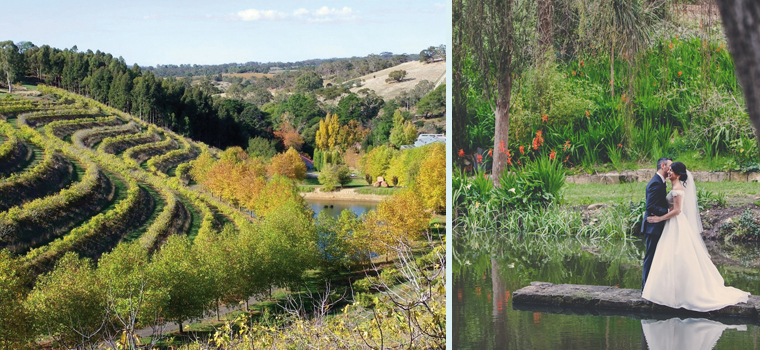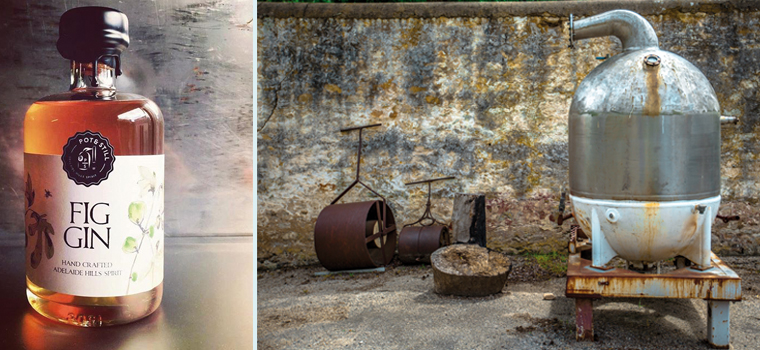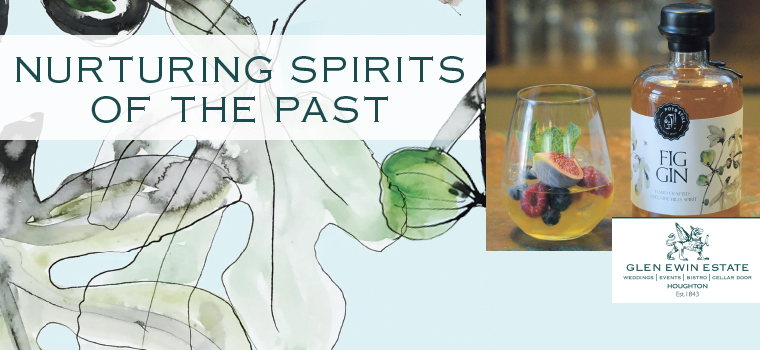With a history dating back more than 170 years, Glen Ewin Estate is back in business with a growing involvement in the spirit and wine industries.
FOR many people who’ve heard of Glen Ewin Estate, their immediate impressions would be of wedding receptions and figs, and until a few years ago that would have been pretty much correct. But no longer.
Glen Ewin is still, of course, one of South Australia’s most popular wedding destinations and is well set up not only with extraordinary surroundings of manicured landscaping, vast and mysterious looking old buildings from its former life as a jam factory, a modern cellar door and function area called The Gatehouse, and a purpose built reception venue built around the 100-year-old pulp shed, where there’s also a highly competent chef in charge of the kitchen.
But under the direction of Willa Wauchope, whose parents Bill and Wendy Wauchope bought the historic property in 1991, Glen Ewin has grown into a substantial, multi-faceted business with an increasing involvement in the wine and spirit industry.
The estate, now reduced to around 30ha of which 13ha is planted with figs, was first settled by George McEwin in 1843. He planted grapes (frontignac, black hambro and roussillon) among the first vineyards in South Australia, but tore them out and smashed his wine vats after discovering one of his workers drunk, victim of the “devil’s work”.
He replaced them with more god-fearing fruit trees, sending fresh fruit into the Adelaide market, but as production grew McEwin turned to using excess fruit to make jam. His plantings included a large fig orchard from which it’s believed he made his first jam in 1862, so there’s symmetry in Willa Wauchope following in his footsteps 150 years later.
Glen Ewin thrived and built a reputation for some of the best jams in Australia, employing up to 100 workers and producing more than 100 tonnes of jam annually. Management issues saw the company falter and die in the late-1980s, the land was sub-divided, the Glen Ewin name was sold off to IXL, and the historic buildings were left to rot until Willa Wauchope’s parents bought the property and began its restoration.

Willa Wauchope established Willabrand as a fig producer in 1994 and has nearly 12,000 fig trees planted along terraces constructed when Glen Ewin’s first orchards were planted more than 150 years ago. He quickly built a national market for its glacé and chocolate-coated figs, and for a time sold fresh figs to supermarkets, but figs, being very soft skinned and having a short shelf life, are too difficult to pack and get to market in a pristine state.
Wauchope’s fast evolving business plan then moved to pick-your-own figs, bringing a whole new stream of customers with Mediterranean and Middle Eastern origins to Glen Ewin, while he pondered what to do with the leftover fig syrup from his value-added products.
The answer was to create a unique range of fig gin, using base spirit from Adelaide Hills distillery Applewood, breaking it down from 42 per cent alcohol to 29 per cent with the addition of fig syrup. The result is a surprising light, not so sweet gin that changes in character depending on how it’s drunk – neat on the rocks, with a squeeze of lime or mixed with tonic as a longer drink.
It met with immediate market acceptance nationally and Wauchope is now contemplating an export market: “It took off much more rapidly than I’d imagined,” he says. “It is a significantly different product and clearly has broad appeal.”
The gin has now been followed by a fig aperitif with 17 per cent alcohol content, a blend of fig syrup with vodka and fig leaf tea, which cuts back the sweetness and adds a longer finish. Wauchope is now thinking about producing fig vodka and fig rum, and plans to restore two substantial stills he’s bought – of 2000 and 3000 litre capacity – so he can make his own base spirit from a yet to be produced fig wine, preferably using solar power.
Of more immediate interest are three conventional grape wines Glen Ewin is producing under The Gatehouse label. These are a shiraz, sauvignon blanc and sparkling currently sourced and made for Glen Ewin by other Hills winemakers, with plans to expand the range with chardonnay, pinot gris and pinot noir.
Glen Ewin also acts as a cellar door for other small Hills producers, some of whom lack their own cellar door, including CRFT Wines, Mt Bera, Vinteloper, Rusty Bike and Jericho Wines: “We are always looking to promote new and interesting wines from the Hill’s region, supporting local winemakers as much as we can.”
Wauchope says he is already sizing up sections of the estate to plant his own vines in what would be, quite literally, a return to Glen Ewin’s roots.
“Glen Ewin has great potential for grapes,” he says. “ We have the land and we have the history, but we have to size up the relative potential of grapes versus figs.”

In the meantime another significant business for Glen Ewin is secure, temperature controlled wine storage in the vast stone and concrete buildings built into surrounding hillsides. Individual bays have been built using jarrah sourced from Port Adelaide wool stores, with locking systems devised by a local locksmith.
Wauchope says for individual customers who might have just a few cases they want stored it’s $3.50 a month per case, with a minimum of $16 a month, but larger customers, often winemakers, use the facility to store barrels and pallets. There are two temperature controlled areas, at 16C, and uncontrolled areas where the temperature stays around 20C.
“We have some very serious collectors who trust us to keep their wine safe and at a stable temperature, but if they want to sell their wine we can help connect them with a database and our cellar door.”
More than 150 years on, Glen Ewin founder George McEwin would no doubt be delighted by the multiple ways his heritage is now being put to work – though what he’d make of fig gin – the “devil’s work” is hard to say.
Article by NIGEL HOPKINS

